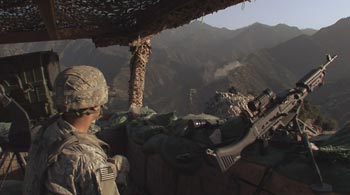
The next president of the United States will inherit a foreign policy nightmare: wars on two fronts, an overstretched military, a resurgent Taliban and a reconstituted Al Qaeda based far from America's reach.
In The War Briefing, award-winning FRONTLINE producer Marcela Gaviria and correspondent Martin Smith offer harrowing on-the-ground reporting from the deadliest battlefield in the mountains of Afghanistan, and follow the trail to the militant safe havens deep inside the Pakistani tribal areas, probing some of the most urgent foreign policy challenges facing the next president.
"The situation is worse; there's no question about that," says Ronald Neumann, the U.S. ambassador to Afghanistan from 2005 to 2007. "Provinces close to Kabul are now having incidents that didn't have incidents before. And to my mind, that is clearly a strengthening insurgency."
The War Briefing begins in the mountains of northeastern Afghanistan, where FRONTLINE embedded with Bravo Company, a unit posted on one of Afghanistan's deadliest fronts. Bravo Company comes under fire almost daily. Attacks have reached an all-time high, now making Afghanistan a deadlier battlefield than Iraq. Often called the "forgotten war," top U.S. commanders concede that the next president will inherit a security situation that has deteriorated markedly over the last two years.
"The next president will face a situation where, in the next year or two, he will have to make the decision that faced the Soviets in 1988 -- either to massively reinforce and to wage a war very aggressively, or to get out," says Michael Scheuer, the former head of the CIA's bin Laden unit. "That's the inheritance of the next president."
In the short term, commanders agree that more troops are desperately needed. Lt. Col. John Nagl, a former counterinsurgency adviser to Gen. David Petraeus, tells FRONTLINE: "In Afghanistan, we simply don't have enough boots on the ground to provide security on the ground, to convince the young men that we're there for the long haul; that if you work with us, we will not only keep you safe, but we'll work with you to build a better future for you and your family."
But the next president's options in Afghanistan will be limited by a depleted military, with some units already on their fifth deployment. "The next president will be told: 'You need to spend more money on training troops. You need to recapitalize the military in equipment. And you might have to think about increasing the size of the military, especially ground forces,'" says Tom Ricks, author of Fiasco. "As one officer at the Pentagon put it to me: 'We're out of Schlitz. There are no extra troops left on the shelf. We're at our limit.'"
Even with more troops, any progress in Afghanistan will be hostage to developments just across the border. As long as the Taliban and Al Qaeda are able to launch attacks from their sanctuaries in the lawless tribal areas of neighboring Pakistan, any policy is likely to fail. But cracking down on the insurgent safe havens in Pakistan's lawless tribal areas presents enormous challenges of its own.
In recent months, special forces have mounted ground assaults on targets inside the tribal areas without the consent of the Pakistani government, prompting growing tensions with the Pakistani army and its new civilian leaders. "The United States does not have the right to go into a sovereign country that is its ally without permission and approval and consent of that ally," Husain Haqqani, the Pakistani ambassador to the United States, tells FRONTLINE. Vali Nasr of the Council on Foreign Relations adds: "This was an early and decisive success we had [against the Taliban] after 9/11. If eight years later it collapses before the very force that we defeated and kicked out of Afghanistan, then the symbolism is tremendous. It would be a major morale booster for extremism across the Muslim world."
